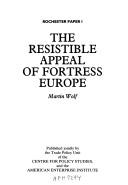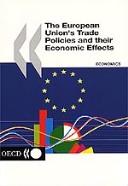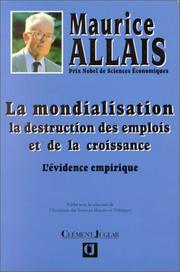| Listing 1 - 10 of 17 | << page >> |
Sort by
|
Book
ISBN: 9782875585974 2875585975 Year: 2017 Publisher: Louvain-la-Neuve Presses universitaires de Louvain
Abstract | Keywords | Export | Availability | Bookmark
 Loading...
Loading...Choose an application
- Reference Manager
- EndNote
- RefWorks (Direct export to RefWorks)

ISBN: 189796921X 0844738719 9780844738710 9781897969212 Year: 1994 Volume: 1 Publisher: London The Center for Policy Studies
Abstract | Keywords | Export | Availability | Bookmark
 Loading...
Loading...Choose an application
- Reference Manager
- EndNote
- RefWorks (Direct export to RefWorks)
Book
ISBN: 1138094722 9781138094727 Year: 2018 Publisher: Abingdon: Routledge,
Abstract | Keywords | Export | Availability | Bookmark
 Loading...
Loading...Choose an application
- Reference Manager
- EndNote
- RefWorks (Direct export to RefWorks)
Governmentality and EU External Trade and Environment Policy applies theories drawn from Foucauldian governmentality studies to investigate the ideological and political roots of the European Union (EU)’s external trade and environmental policy and their effects on the transnational legal landscape. The EU’s desire to spread environmental norms abroad is viewed in the book as a significant feature of contemporary EU trade policy. The EU’s activities in this area have not been uncontroversial for other transnational legal actors. States, individuals, and organizations have challenged the EU’s various trade and environment policies, arguing that they are coercive, unfair, over-reaching, or inefficient. Meanwhile, these policies have also raised a number of questions from the perspective of legality and political theory. This book considers what the practice of EU external trade and environment policy, and international resistance to it, tells us about the way the EU perceives the role and limits of transnational government, the means and ends of politics, and the drivers of human and institutional behavior. Jessica Lawrence examines the legal and political discourse of the EU and those affected by its policies. By studying legal cases, statements by officials, legislative texts, press releases, and other representative documents the book identifies the rationalities, technologies, and subjectivities that underlie contemporary EU activity in this area. The overall effect paints a more complicated and nuanced picture of the EU’s vision of itself and its goals; one that ultimately seeks to provide a better understanding of the functioning of power in this area

ISBN: 1280083581 9786610083589 9264188533 9264185364 Year: 1998 Publisher: Paris : OECD Publishing,
Abstract | Keywords | Export | Availability | Bookmark
 Loading...
Loading...Choose an application
- Reference Manager
- EndNote
- RefWorks (Direct export to RefWorks)
This paper retraces the Communities external liberalisation efforts, and discusses, where relevant, the repercussions of internal liberalisation on foreign competitors. The aim of the paper is to clarify, and when feasible, to quantify the economic effects of the EU’s trade policies. To this end, it provides an overview of past liberalisation efforts, reviews trade indicators in international comparison and lays out the future trade agenda of the Community. The empirical evidence provided in the paper points to little evidence for trade diversion due to integration in Europe, while trade is likely to have boosted area-wide income significantly. It is openness in general, rather than regional integration, that has favoured growth in Europe ...
Book
ISBN: 9780754679301 9780754679318 9780754698357 0754679314 9786613367389 0754679306 1283367386 0754698351 1317139240 9781283367387 9781315581033 1315581035 9781317139249 6613367389 9781317139225 9781317139232 Year: 2012 Publisher: Farnham Ashgate
Abstract | Keywords | Export | Availability | Bookmark
 Loading...
Loading...Choose an application
- Reference Manager
- EndNote
- RefWorks (Direct export to RefWorks)
The European Union is a key player in international economic relations, but its exact role and how it goes about making decisions and negotiating is often poorly understood within and especially outside the EU. When does the EU play a proactive role and when does it follow? When is the EU a distinct actor and when is it just one level in a multi- level process of negotiation in which the member states are the main actors? Does the EU possess normative power in external economic relations? Does the EU have the capability and willingness to use its still significant economic power? European Unio
International economic relations --- European Union --- European Union countries --- Foreign economic relations --- Commercial policy --- Economic policy --- 337.142 --- Foreign economic relations. --- Commercial policy. --- Economic policy. --- E-books --- #SBIB:327.7H233 --- #SBIB:33H071 --- Europese Unie: externe relaties, buitenlands- en defensiebeleid (ook WEU) --- Economische internationale betrekkingen --- European Union countries -- Commercial policy. --- European Union countries -- Economic policy. --- European Union countries -- Foreign economic relations. --- Commerce --- Business & Economics --- International Commerce --- European Union countries - Foreign economic relations --- European Union countries - Commercial policy --- European Union countries - Economic policy --- Relations économiques internationales --- Politique commerciale --- Politique économique
Book
ISBN: 9781138786769 9781315766591 9781138214910 9781317660897 9781317660903 1315766590 1138214914 1138786764 Year: 2015 Volume: 2 Publisher: Abingdon, Oxon ; New York, NY : Routledge,
Abstract | Keywords | Export | Availability | Bookmark
 Loading...
Loading...Choose an application
- Reference Manager
- EndNote
- RefWorks (Direct export to RefWorks)
Industrial policy --- Labor policy --- Politique industrielle --- Travail --- Politique gouvernementale --- European Union countries --- Pays de l'Union européenne --- Commercial policy. --- Politique commerciale --- Commercial policy --- Pays de l'Union européenne --- Industrial policy - European Union countries --- Labor policy - European Union countries --- European Union countries - Commercial policy
Book
ISBN: 3030043665 3030043657 9783030043650 Year: 2019 Publisher: Cham : Springer International Publishing : Imprint: Springer,
Abstract | Keywords | Export | Availability | Bookmark
 Loading...
Loading...Choose an application
- Reference Manager
- EndNote
- RefWorks (Direct export to RefWorks)
This book provides a comprehensive portrait of how international responsibility of the EU and the Member States is structured under the EU’s international investment protection agreements. It analyses both the old regime as represented by the Energy Charter Treaty and the new regime as represented by the new EU investment treaties, such as CETA, TTIP, the EU-Singapore Agreement and the EU-Vietnam Agreement. The international responsibility of the EU, being a “special” international organisation, is in and of itself an important and challenging topic in public international law. However, in the context of international investment law, and especially with regard to the emerging new EU investment treaties, the topic is largely unexplored and represents new terrain. The book promotes the development of law in this area and provide a springboard for further research.The book puts forth the thesis that the determination of the EU or a Member State as respondent in a dispute under the new EU investment treaties has a substantive effect on the respondent’s international responsibility. The international law effects of the respondent determination will surely be one of the central topics in future debates on the new EU investment treaties. The book further compares the EU regulation that allocates financial burdens between the EU and the Member States arising out of international investment disputes with the only other genuinely existing allocation system in federal states to date, namely that of Germany. The book finally reveals many shortcomings of the new EU responsibility regime in international investment law and provides some suggestions on how they can best be remedied.
European Union. --- European Law. --- International Economic Law, Trade Law. --- European Union Politics. --- Law—Europe. --- International law. --- Trade. --- Law of nations --- Nations, Law of --- Public international law --- Law --- Free trade - European Union countries --- European Union countries - Commercial policy --- European Union countries - Foreign relations --- Free trade --- European Union countries
Book
ISBN: 1462361889 1452790485 1283513331 9786613825780 1451911432 Year: 2007 Publisher: Washington, D.C. : International Monetary Fund,
Abstract | Keywords | Export | Availability | Bookmark
 Loading...
Loading...Choose an application
- Reference Manager
- EndNote
- RefWorks (Direct export to RefWorks)
The paper provides quantitative estimates of the impact of the European trade agreements on trade flows. It applies both static and dynamic panel estimation techniques. The results are useful to policymakers because new intra-European trade agreements are being negotiated. In the absence of a further expansion of the European Union, estimates of alternative policies may help to clarify the policy debate. The paper also illustrates that the performance of individual countries under the trade agreements can be explained in terms of their macroeconomic environment. The conclusions are likely to be relevant to the western Balkan countries and Ukraine.
Europe -- Commerce -- Econometric models. --- Europe -- Commercial treaties -- Econometric models. --- European Union countries -- Commercial policy -- Econometric models. --- International economic relations. --- Exports and Imports --- Trade Policy --- International Trade Organizations --- Trade: General --- International economics --- Trade agreements --- Customs unions --- Imports --- Exports --- Trade relations --- Commercial treaties --- Protectionism --- International trade --- Ukraine --- European Union countries --- Europe --- Balkan Peninsula --- Commercial policy --- Econometric models. --- Commerce
Book
ISBN: 9781472443649 9781472443618 9781315554181 9781317019855 9781317019862 1472443624 1472443640 1472443632 1472443616 Year: 2015 Volume: *2 Publisher: Aldershot [etc.] Ashgate
Abstract | Keywords | Export | Availability | Bookmark
 Loading...
Loading...Choose an application
- Reference Manager
- EndNote
- RefWorks (Direct export to RefWorks)
Hommage de Mario Telò
United States --- European Union countries --- Etats-Unis --- Pays de l'Union européenne --- Foreign economic relations --- Commercial policy. --- Commercial treaties. --- Relations économiques extérieures --- Politique commerciale --- Commercial treaties --- Accords commerciaux --- Commercial policy --- PTCI --- Partenariat transatlantique de commerce et d'investissement --- TAFTA --- TTIP --- Traité de libre-échange transatlantique --- Trans-Atlantisch Vrijhandels- en Investeringsverdrag --- Transatlantic Trade and Investment Partnership --- Pays de l'Union européenne --- Relations économiques extérieures --- United States - Foreign economic relations - European Union countries --- European Union countries - Foreign economic relations - United States --- United States - Commercial policy --- European Union countries - Commercial policy --- United States - Commercial treaties --- European Union countries - Commercial treaties

ISBN: 2908735121 9782908735123 Year: 1999 Publisher: Paris Ed. Clément Juglar
Abstract | Keywords | Export | Availability | Bookmark
 Loading...
Loading...Choose an application
- Reference Manager
- EndNote
- RefWorks (Direct export to RefWorks)
International economic relations --- Economic development --- Free trade --- Unemployment --- Relations économiques internationales --- Développement économique --- Libre-échange --- Chômage --- European Union countries --- Pays de l'Union européenne --- Economic policy --- Politique économique --- International economic integration --- Labor market --- Commercial policy --- -331.3 --- 327.3 --- Employees --- Market, Labor --- Supply and demand for labor --- Markets --- Common markets --- Economic integration, International --- Economic union --- Supply and demand --- -EU countries --- Euroland --- Europe --- -Commercial policy --- Relations économiques internationales --- Développement économique --- Libre-échange --- Chômage --- Pays de l'Union européenne --- Politique économique --- 331.3 --- Integration, International economic --- Markets, Common --- Union, Economic --- Commercial policy. --- International economic integration. --- Labor market - France --- European Union countries - Commercial policy
| Listing 1 - 10 of 17 | << page >> |
Sort by
|

 Search
Search Feedback
Feedback About UniCat
About UniCat  Help
Help News
News